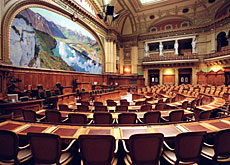
Parliament grapples with spending cuts

The Swiss parliament is debating controversial proposals to cut public spending by SFr3.3 billion ($2.4 billion) to avoid massive deficits over the next few years.
Parliamentarians are divided on the issue: some say the cuts are too severe, while others argue that they don’t go far enough.
Switzerland’s national debt currently stands at SFr120 billion and the government expects this to grow by SFr3 billion a year.
To stem the losses, the government has drafted a radical savings plan – the biggest spending cut in Swiss history.
It wants to slash spending by SFr3.3 billion a year as of 2006. The plan envisages reducing spending by SFr1 billion in 2004 and SFr2.2 billion in 2005.
Announcing the budget cuts, the cabinet said it was aware that they could have “painful consequences” for the Swiss economy.
However, the cabinet emphasised that the cuts were “well balanced and coherent”, pointing out that all government ministries would be affected.
Savings plan
The House of Representatives and the Senate are expected to vote on the savings plan by the end of the December.
Political parties, trade unions and the 26 cantons have expressed concern over the cuts. The cantons in particular fear they will lose out the most.
Parliament is divided over the issue: the centre-right parties say they would like to see belts tightened further, whereas the centre-left Social Democrats think the measures go too far.
Ruth Genner, co-president of the Green Party, has accused the government of using the national debt as an excuse for reneging on its commitments.
The weekly news magazine, “Facts”, claims the cuts simply pander to the demands of the rightwing Swiss People’s Party and business leaders.
Opposition
Critics fear the country’s asylum and energy policies will suffer if the savings plan goes through.
The Swiss Refugee Council, a non-governmental organisation, has voiced concern that asylum seekers will lose welfare benefits and turn to crime.
Opponents have also criticised plans to axe almost two-thirds of the budget for EnergySwitzerland, the federal research and promotion programme for renewable energy sources.
Funding for the Environment Agency is set to be slashed by more than 15 per cent, threatening ongoing environmental projects in Switzerland.
Critics claim the cuts will put back energy policies by decades and destroy projects that have already borne fruit.
Facing budget cuts of SFr666 million a year, the environment, transport, energy and communications ministry is likely to be hit hardest.
Railways facing cuts
The Swiss Federal Railways stands to lose SFr150 million – a move that would postpone the planned refurbishments of regional railway stations.
swissinfo/Swiss Radio International is looking at losing all its government funding by 2006. It would then be left to the Swiss Broadcasting Corporation to guarantee future financing of the news organisation.
The interior ministry stands to lose a total of SFr639 million, with SFr255 million to be slashed from the old age pension scheme.
Funding for education, research and technology faces a reduction of SFr194 million, a move which has prompted criticism from the Swiss National Fund.
“The competitiveness of Switzerland’s research is at stake,” the foundation said in a statement urging parliamentarians to give research more priority.
swissinfo, Christian Raaflaub (translation: Billi Bierling)
Proposed spending cuts:
2004: SFr1 billion
2005: SFr2.2 billion
2006: SFr3.3 billion
Finance ministry: SFr451 million
Economics ministry: SFr417 million
Defence ministry: SFr270 million
Foreign ministry: SFr148 million
Justice ministry: SFr116 million
Environment, transport, energy and communications ministry: SFr666 million
Interior ministry: SFr639 million

In compliance with the JTI standards
More: SWI swissinfo.ch certified by the Journalism Trust Initiative











































You can find an overview of ongoing debates with our journalists here . Please join us!
If you want to start a conversation about a topic raised in this article or want to report factual errors, email us at english@swissinfo.ch.